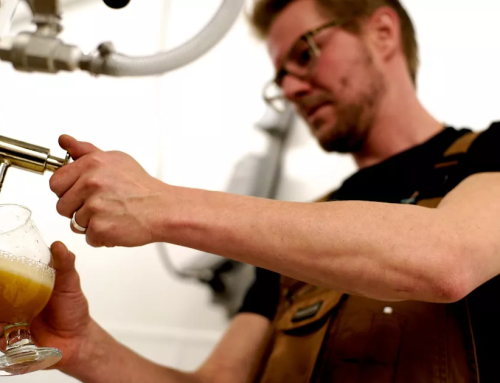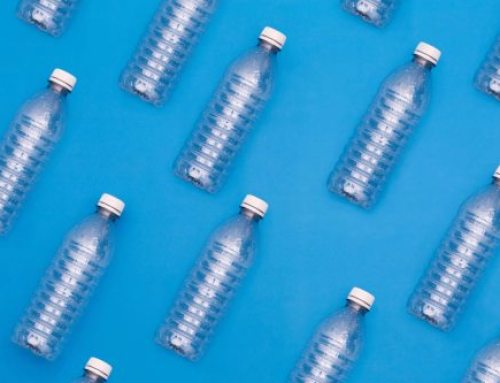Kombucha: can the fermented drink compete with beer at the bar?
This healthy drink has already moved from health food shops to cafés - and now it's being offered in pubs as an alternative to alcohol.
When I was a child, craft beer was what my grandfather produced under his stairs.
At Christmas, my father and uncles would gather there, holding up mugs of cloudy beer to the light and shaking their heads in appreciation.
But more and more home brewers are opting for kombucha, a traditional non-alcoholic drink made from fermented tea.
Take Jonny Wilkinson, one of England's best-loved rugby stars.
Rugby players are perhaps best known for being prolific beer drinkers, but Wilkinson has been brewing his own kombucha for four years.
He claims that introducing fermented foods into his diet has given him "a lightness, less conflict in my bowels and a more alert and fluid nature to everything".
In May, he launched his own brand, No1 Kombucha, in Sainsbury's, with the aim of bringing this natural soft drink to the general public.
He is not alone in this mission.
Fast food chain Leon is now offering kombucha brewed in Suffolk by LA Brewery, while another British brand, Real Kombucha, will soon be rolled out in 320 Fuller's pubs.
In less than a year, Real Kombucha has reached "almost 50 Michelin-starred restaurants, nearly 300 major hotels and 55 Laines pubs", according to its founder, David Begg.
The move from health food shops to trendy coffee shops to the general public was rapid.
The founder of LA Kombucha, Louise Avery, is partly responsible for the drink's evolution in the UK from obscure cult company to coffee culture.
She started by making it at home under the brand name Lois & the Living Teas.
"About five years ago, I started taking these bottles of cloudy milk kombucha to nice cafes in Islington and Hackney in London, who would strain it and serve it to customers."
The product flew off the shelves, word spread and Yauatcha, a dim sum restaurant in Soho, came knocking.
Many of these café owners had come to London from abroad - Germany, Australia, Canada - and were already familiar with kombucha.
According to Avery, the British owners were more sceptical, "because there were bits floating around in it, like yeast; people were a bit scared and disgusted.
I had to explain to them that it was a living food and that it was continuing to develop".
In response, it has taken steps to make its product more acceptable to mass market consumers.
"I've found a way to filter it slightly and add a little carbonation to get the bacteria into suspension; I make sure it's refrigerated and give it a short shelf life to keep as much bacteria as possible without it being an explosive product with bits floating around in it."
It worked. When LA Kombucha was launched in June, Avery sold 2 000 bottles.
The following month, sales rose to 10,000; within six months, Leon had signed up and she had to build a second brewery.
Promising scientific discoveries about how our gut affects everything from mental health to autoimmune diseases have spurred demand for fermented products claimed to be good for gut health, such as kefir (yoghurt drink), kimchi (Korean-style fermented cabbage) and kombucha, which probably originated in China.
The process of brewing kombucha is relatively simple.
The tea (green, black or a mixture of the two), sugar and filtered water are sealed by a sticky-looking cellulose mat called Scoby (for "symbiotic culture of bacteria and yeast").
Scoby's, which you can buy on eBay, are naturally produced by bacteria and contain the micro-organisms needed to start the fermentation of kombucha.
You float this biofilm on top of your mixture and leave it to infuse for between seven and thirty days, depending on the weather conditions and your personal taste.
The tea itself ferments, while the yeasts convert the sugar into alcohol, which the bacteria convert into acetic acid, producing carbon dioxide bubbles.
The longer the infusion, the less sweet the tea and the more vinegary it becomes.
The tangy taste of kombucha can be enhanced by adding fruit and spices, which is what most commercial offers do.
LA Brewery's ginger variety is satisfying and fiery, like a traditional ginger beer with a hint of lemonade and the complex, tangy gherkin flavour you get with kombucha.
No1's passion fruit and goji are fruity and refreshing.
Like LA Brewery and No1, Real Kombucha also comes in three choices, although none of them have added flavourings - the differences come from the types of tea used.
But these three producers are careful to avoid making specific health claims, and instead emphasise the sensory experience of their drinks as something to be enjoyed by connoisseurs.
Why not focus on the health aspect? Because, according to Paul Humphreys, Professor of Applied Microbiology at the University of Huddersfield, "all the data is either anecdotal or from animal studies.
There are a few studies on cholesterol and hypertension in rats that show some potential".
The only published human clinical studies, he says, tend to be one-off events with negative effects such as people suffering from acidosis - when there is too much acid in the body - perhaps after drinking too much kombucha.
Part of kombucha's appeal lies in its live bacterial content, but it is not yet known to what extent the microbes contained in this drink are beneficial.
According to Humphreys, there aren't many "classic probiotic bacteria".
No lactobacillus or bifido bacteria, which are the dairy probiotics.
We hear that people find it in kombucha, but it's a far cry from what you find in some yoghurts or kefir".
That's not to say that the bacteria in kombucha don't do any good - we just don't know. And because it's a wild fermented beverage, the yeast and bacteria profiles fluctuate.
Humphreys brews his own kombucha at home as an alternative to fizzy drinks and alcohol. A number of brands have sent their products to his laboratory for analysis, but, he says: "I would never make health claims based on what we found.
I wouldn't even hazard a guess.
It's such a complicated product".
He prefers his kombucha sour and thinks that the commercial versions leave more sugar than is found in the traditional drink. "
It's lost in the mists of time, but these fermentations were originally intended to make the water drinkable, so they were probably quite acidic."
Due to its high yeast content, however, this drink contains B vitamins, which can be beneficial in case of deficiency.
It also contains vitamin C.
And polyphenols - antioxidant-rich plant micronutrients that nourish the good bacteria in your gut.
They come from the tea itself, but may be more beneficial in kombucha than in an ordinary cup of tea.
Whether the microbiological benefits can be proven or not, there is the undeniable advantage that commercial kombuchas often contain less than a third (or less than half with No1) the sugar of ordinary soft drinks, and no artificial sweeteners.
And if they help heavy drinkers to reduce their alcohol consumption, that's another victory.
That's precisely what Begg is hoping for, as Real Kombucha arrives in pubs and bars across the UK. "We've approached it entirely as a replacement for alcohol," he says.
"We're in the champagne, wine and craft beer area".
Rather than comparing his products to soft drinks, Begg puts them "somewhere between a fruity prosecco and a lighter dry cider".
Sommeliers were called in to give advice on food pairings.
The young 'first flush' Darjeeling tea leaves used in his Royal Flush kombucha produce notes of raspberry, rhubarb, blackcurrant and, he says, "a little white peach in the flavour profile".
It's certainly interesting and strong enough to sip, occupying your senses like any alcoholic beverage.
Another product in the range is called Smokehouse because the black tea from the hills of southern China has a slightly smoky taste, but the apple and caramel flavours it produces mean that people associate it with cider.
The only things missing, says Begg, "are the legs or the power of the alcohol, but Royal Flush even has a slightly irritating astringency in the background".
In the US - where sales of kombucha and other fermented drinks grew by 37% in 2017, while the rest of the soda market barely grew - it has also become a popular mixer for cocktails.
Food website Bon Appetit has published recipes for kombucha cocktails which, it says, "prove that kombucha and alcohol are made for each other".
Food blog Chowhound suggested, "13 kombucha cocktails to up your bartending game."
It's no surprise that kombucha can now be found in the fridges of some of the UK's top mixologists.
Begg first discovered kombucha when a friend was making it at home, and he immediately satisfied his craving for alcohol.
He had largely given up alcohol, but didn't want sugary fizzy drinks or water when he went out socially. Avery agrees: "Alcohol has a number of receptors and so does kombucha.
The umami, acidity, sweetness, fizz and viscosity settle on the tongue".
It remains to be seen whether pub-goers will order it in place of alcohol, but, says Begg: "We've done it in restaurants - it's done well at the top end of the market as a replacement for wine.
Now we're saying the pub is the next bastion."
Follow our courses here : https://pretasurvivre.com/product-category/business/










A Kombucha bar is a good idea and will make a nice change! Thank you for all your valuable information.
It's up to you Laurent! Have a good evening.
Could you advise me on how to make franchises?